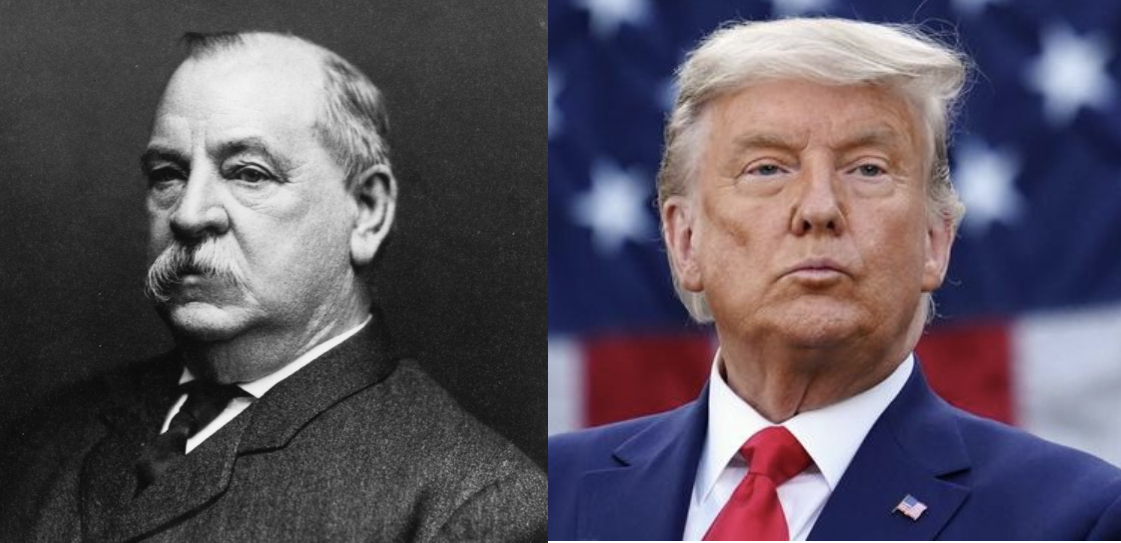Is Donald Trump the Next Grover Cleveland?
In the offbeat 1888 Presidential Election, outsider Grover Cleveland was narrowly turned out of office in favor of the establishment pick Benjamin Harrison. Four years later, voters returned Cleveland to office for a second term. Cleveland is the only President who served two non-consecutive terms. Could Donald Trump repeat this feat by winning the 2024 Presidential race? There are many correlations between the two circumstances.
Interested in learning more about Israel and current events in the Middle East? Visit Inside Israel News today!
A Presidency of Firsts
When a young Grover Cleveland volunteered on the 1856 presidential campaign of Pennsylvania Democrat Senator James Buchanan, young Grover had no idea that he would be the next Democrat candidate to win the Presidency some 28 years later. In the post-Civil War Era, voters were reluctant to entrust the once pro-slavery, pro-secession Democrats with the nation’s highest office; and rightly so. The 1876 election saw a Democrat come close to winning, but the corrupt political machine of the time diverted electoral votes to the Republican candidate offering the Democrats the concession that the Reconstruction (military occupation) of the South would come to an end. The Democrats remained in the electoral doghouse as the Republican political machine of the time soldiered on indifferent to popular demands.
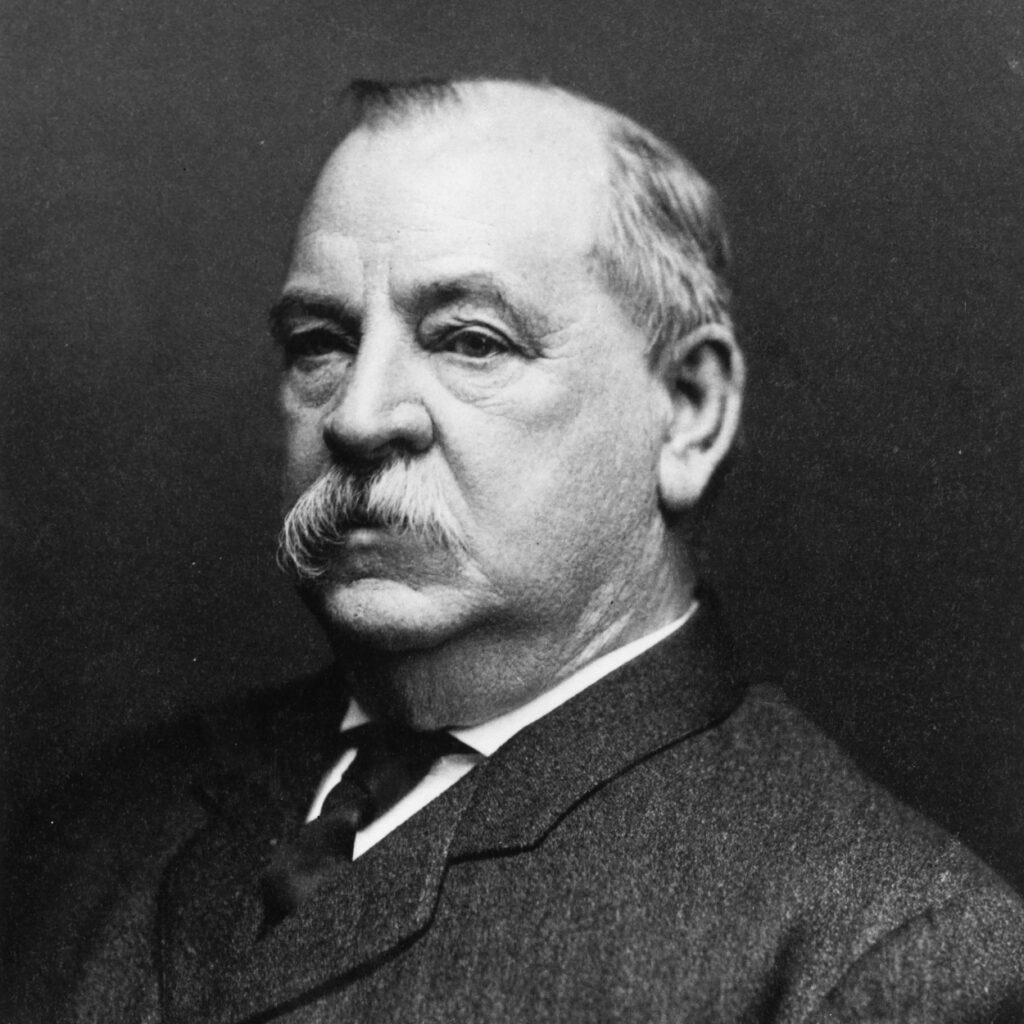
In 1882 New York Democrats bucked their own political machine and nominated Buffalo attorney Grover Cleveland for Governor on an anti-corruption ticket. Cleveland went on to upset the Republicans and win the state’s coveted governorship. News of this outsider spread throughout the country leading to what can only honestly be called a meteoric rise into national notoriety. Cleveland was the hero of populists everywhere who saw him as their champion against the machine men in both parties. He was able to win the Democratic Presidential nomination in 1884 in large part due to his stance on currency. As a “Sound Money” man he opposed the issuing of silver coins that would inflate the currency, a policy championed by some populists in that time and one that would later dominate the 1896 election. In other words, he was a safe, popular, dark horse from the Northeast, who as a political outsider, came with none of the baggage of his competitors.
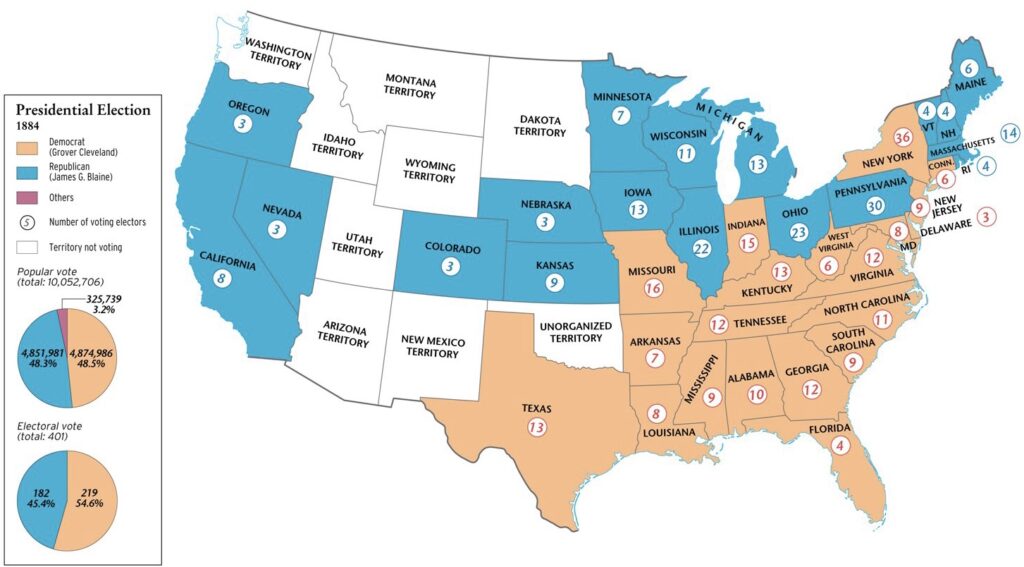
His opponent, Secretary of State James Blaine could not have been more distinct from Cleveland. Blaine was a Republican machine politician from Maine who embodied the establishment. No one could challenge his credentials and qualifications as he had served as Secretary of State, a Senator, Speaker of the House and as a member of the House of Representatives for decades. Yet, like the rest of the stuffy political class he had lost the support of the populist anti-corruption movement. Much as later establishment politicians would do in 2016, they underestimated the public angst against the political class. Cleveland would be elected to office as the first Democrat to hold the Presidency since the Civil War, and the only Democrat to hold the office between 1861 and 1913. He would be the first President to marry while living in the White House; an officer of the United States Marine Corps named John Phillips Souza would conduct the band at the wedding.
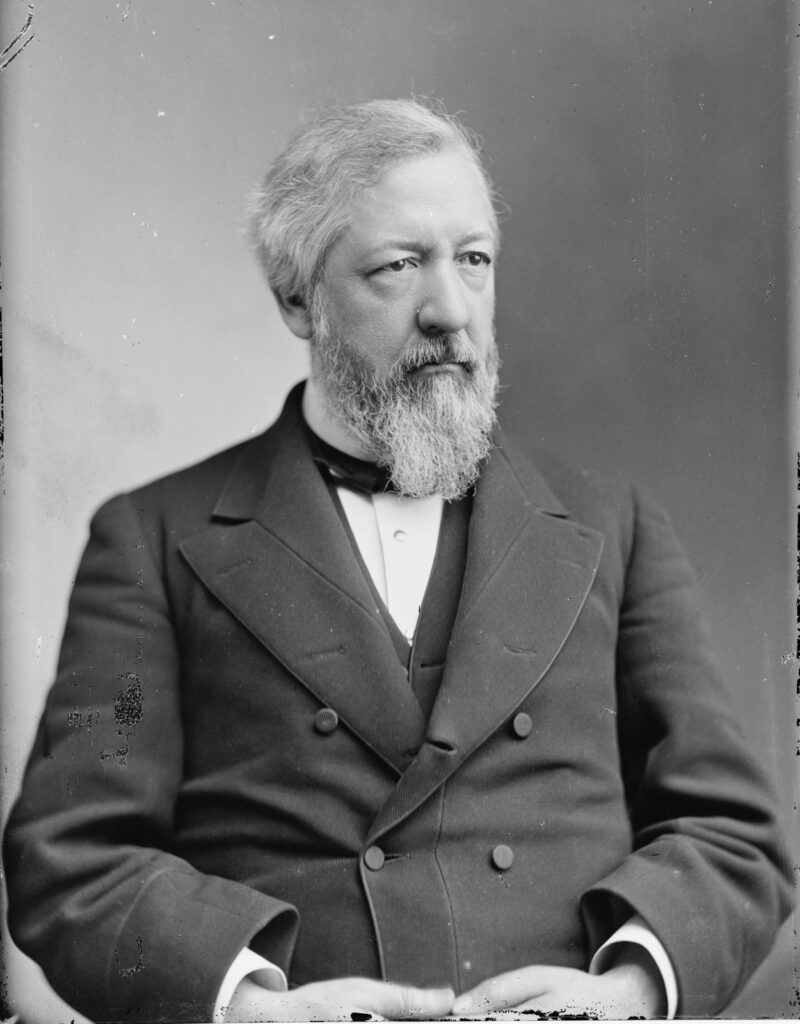
In his second term in office 1893-97, his young wife (who was decades younger than he) Frances Cleveland would become the first woman give birth to the President’s child in the White House. Esther Cleveland was born on September 9th, 1893, during Cleveland’s second term. Thomas Jefferson’s grandchild James Madison Randolph held the honor of being the first child born in the White House in 1806.
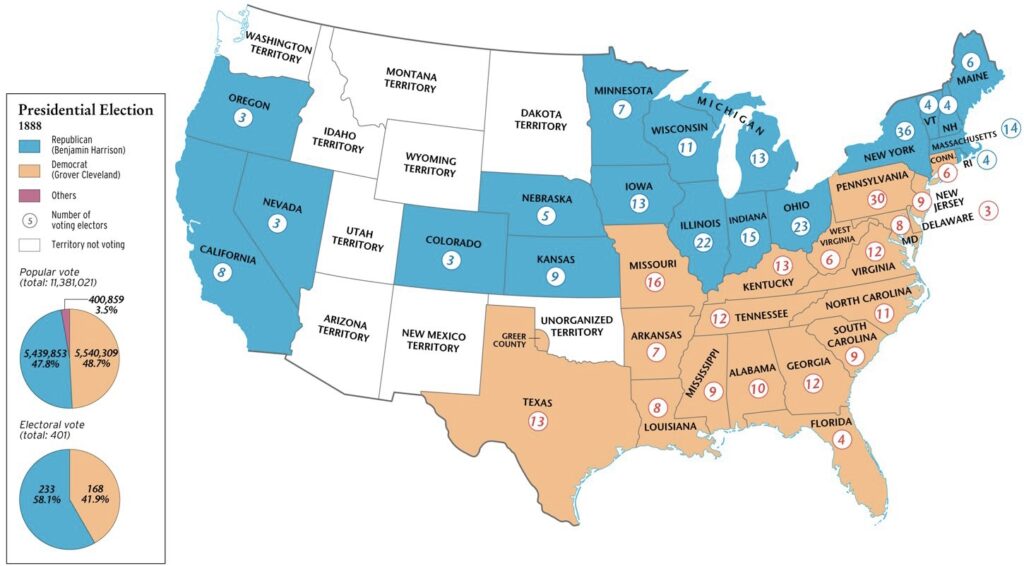
In 1888, “Mugwumps,” Republicans who had voted for Cleveland in large numbers in the previous election, abandoned him, and the swing states of Indiana and New York went over the Benjamin Harrison, grandson of President William Henry Harrison. Harrison was likewise an establishment Republican and the election was full of corruption and vote buying. Critically, Cleveland’s opposition to pensions for Civil War veterans of the Union Army was unpopular. The pensions would have been expensive and Cleveland felt they would prove to be a fiscal burden. Cleveland also sought to lower tariffs which he saw as harmful to consumers. Industrialists and many factory workers preferred higher tariffs because they meant more profits and higher wages. Cleveland won the popular vote but with the loss of New York’s 36 electoral votes, failed to win a majority of the electoral college.
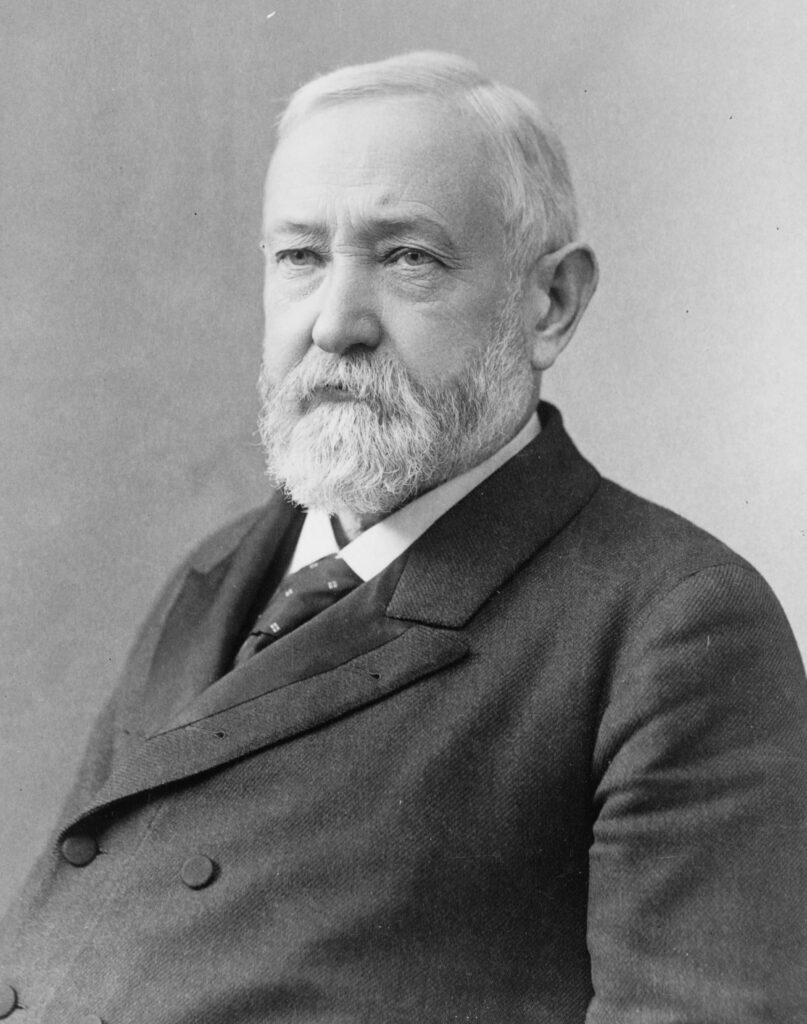
The Clevelands were disheartened and moved out of the White House in 1889. They remained in Washington DC and continued to be a political force in the years that followed. The Civil War pensions were enacted and they proved to be just as great a fiscal disaster as Cleveland had predicted. By 1892, voters were completely disillusioned with Harrison, and Cleveland bested him easily in a three-way race that saw the Populist Party enter the political fray for the first time. Cleveland returned to office as the first president to serve a non-consecutive second term. Once again, voters preferred the stable but incorruptible Cleveland to the establishment and to the more dangerous radicals who sought currency devaluation. There was a terrible depression in 1893 that ruined Cleveland’s second term, but he kept the country on an even keel long enough to recover.
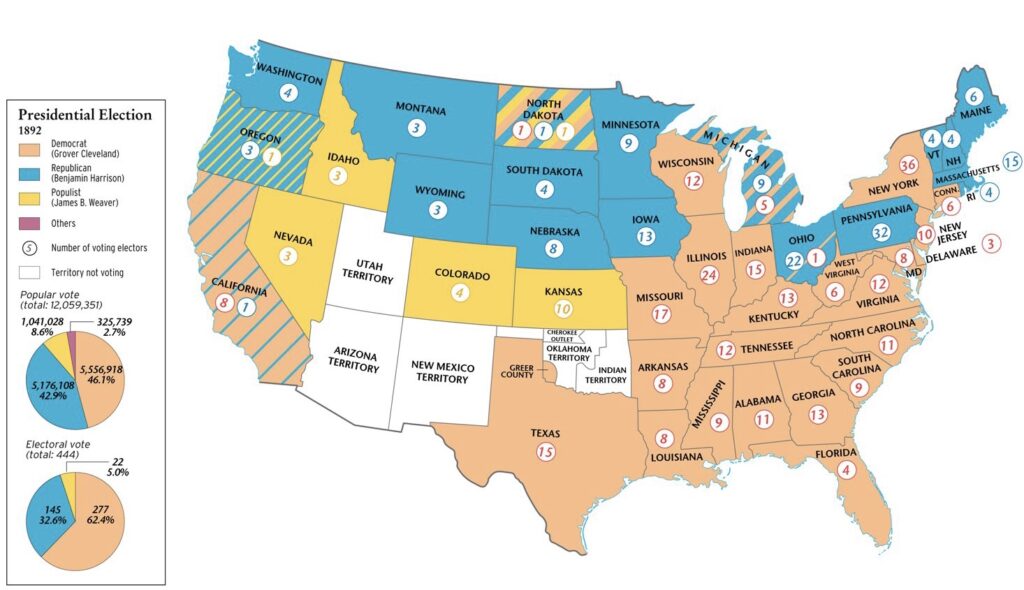
Grover Cleveland’s presidency forever changed the course of national politics. In 1896 Ohio Senator William McKinley would win the Republican nomination and strike a more populist tone in some ways while supporting high tariffs. He likewise kept to Cleveland’s even-handed economic policies and anti-corruption agenda. The Democrats would, in an upset, end up nominating the young populist firebrand and monetary radical William Jennings Bryan. McKinley’s coalition of farmers, factory workers, immigrants, Catholics, industrialists, and the Republican base would set the tone of Republican politics well into the 20th Century. He certainly paved the way for the reforms of Theodore (Teddy) Roosevelt, who would succeed him following his assassination in 1901.
Is Trump the Next Grover Cleveland?
In 2016 Donald Trump upset the political establishment in a very similar manner to Cleveland’s win in 1884. Trump struck a very different chord from previous Republicans by speaking in a common manner and seeking the support of average, working class voters. During his tenure in office he earned the support of tens of millions more supporters, more than a quarter of them from the country’s diverse minority populations (in record numbers, for a Republican). Nevertheless, in the 2020 election he faced the wrath of the establishment who “fortified” (read: rigged) the election to ensure that their man would prevail. The media conspired with Democrats to portray Trump as troublesome and incompetent amateur who was behind every ill in our society. Meanwhile, they permitted no examination of his opponent, the stale Joe Biden. Biden was sold as a return to the “normalcy” of the professional political class. President Trump tried to warn voters that the Democrat candidate in fact represented a radicalized party bent on a pseudo-totalitarian regime that would punish those who had dared to oppose them by electing Donald Trump.

A few weeks into the Biden Administration we are already seeing the fruits of the radical left agenda: tens of thousands of good jobs for working class Americans have been destroyed. Congress is spending money wastefully for “Covid Relief,” giving some Americans money while financing every pet project anywhere in the world regardless of whether there is any palpable benefit to American citizens. Open borders mean cheap labor and sex trafficking that benefit billionaires, but lower wages and higher crime for ordinary Americans. When young investors drove the price of Gamestop stock skyrocketing, a call to the White House from a few well-connected individuals led to the closure of trading in that stock. Hedge funds that had shorted the stock lost some $70 billion. The well connected, those who have influence with the political class (the Swamp if you will) are profiting nicely under Joe Biden whilst ordinary people struggle to pay their bills and feed their children. Government “of the elite, by the elite, and for the elite” is not what most Americans voted for last November regardless of which candidate received their vote. The administration also has no time for Black Lives Matter, or any of the radical left groups who thought they were launching a “social justice revolution” last summer. Dissatisfaction, disillusionment, and disappointment await all of those who had hoped for normalcy under the restored political establishment.
Already, many people who actually cast their legal vote for Joe Biden are expressing regret. Many believe they should have voted for Trump, others are just disaffected by the results of their choice. There was little to no excitement for Biden in the first place, but now enthusiasm for him and the political establishment is going to reach new lows. It was one thing when Biden could just charge that Trump had no plan for addressing the Wuhan Virus (Covid-19), but now his administration has admitted that there is nothing they can do about it. What changed? Has the virus become less deadly? Has it become less contagious? Certainly not. Perhaps the response to the virus was overblown in order to harm Trump politically and now the establishment are looking for the crisis to blow over?
Joe Biden and his advisers cannot match the competence of Trump and his administration who brought historic economic prosperity, peace deals, and set the United States in a strong position internationally. Already, China and Iran are sabre-rattling as they sense the weakness of the American regime. The economy is already in an abysmal place, and Democrats are talking about more than doubling the minimum wage, expanding social programs, and bloating the bankrupt and insolvent Federal government–again, to the general detriment of the working class.

In spite of the smears against him regarding the events of January 6th, events he did nothing to exacerbate and which were timed to shut down the debate on election fraud, Trump remains popular. Several leftwing activists of the BLM and Antifa movements have since been arrested for entering the Capitol Building. President Trump retains the lead for the Republican nomination in 2024 even now if he chooses to pursue it. Polls show more than a quarter of Republicans remain loyal to Trump himself. Another 55% would prefer a candidate with Trump’s agenda but a more professional presentation. Only about one in five Republicans want to return to the pre-Trump Republican Party agenda. In fact, as many as 70% of Republican voters would consider leaving the GOP to join a new Trump-oriented party, if he chose that course. Trump has indicated he intends to continue with the Republican Party but these numbers are still telling. The former President’s strong position is among the reasons for the ridiculous second impeachment, a highly unconstitutional effort to prevent the former President from seeking office again. Naturally, this has no hope of succeeding. Conviction requires a 2/3rds vote of the Senate and any Republican who votes to convict is finished politically.
As the Biden Administration bungles its way forward disappointing everyone over the next several years, Trump will be remembered ever more fondly. It is not at all inconceivable, then, that Donald Trump could seek the Republican nomination, which he would almost certainly win, and contest the 2024 election with a strong chance of winning. Now that he has left office and the courts are willing to hear his legal teams challenges on the merits rather than just throwing them out without cause, the President is winning an overwhelming number of these lawsuits. Republican state legislatures in swing states are also going to tighten their election rules. It is unlikely that the establishment will be able to offer a repeat performance of 2020. The GOP is also likely to retake Congress in 2022 which will prevent the Democrats from implementing their radical agenda. Trump has already announced that he will focus on trying to win back Congress and, of course, helping to elect better Republicans to Congress than those who turned against he and the GOP base this year.

In 1892, American voters rejected the political establishment in great numbers and restored Grover Cleveland to office for a non-consecutive second term; a feat that has not been repeated since. In 2024, Donald Trump could very well come back to end the elitist regime in Washington. Donald Trump has already had a significant impact, but his agenda and the promise of his reforms remain unfulfilled. History has a way of repeating itself.




